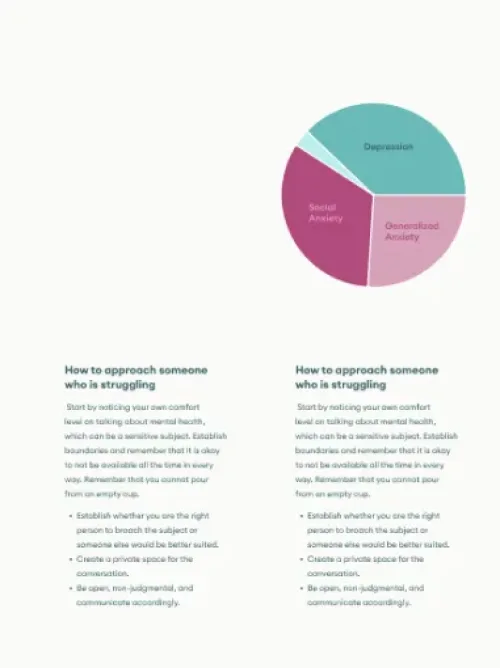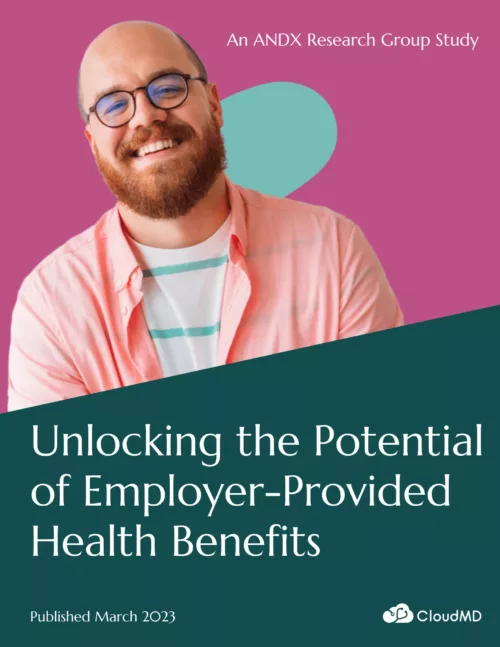6 Tips for Ensuring Your Employee and Family Assistance Program (EFAP) Delivers Positive Outcomes

5 Minute Read
It is commonly understood that providing Employee and Family Assistance Programs (EFAPs) is an expected offering in a group benefits package to support employee well-being. However, support and outcomes are two very different things. Not all EFAPs are designed to drive utilization and strong outcomes. As selecting the right EFAP partner can significantly impact your organization’s level of engagement, productivity, morale, and even overall workplace culture, it is crucially important that the choice you make is the most effective one.
One recent report by Canadian HR Reporter showed that 56% of individuals had an issue that was making it hard to concentrate on work—this dropped to 28% three months after counselling. Additionally, 29% of individuals missed half a day or more of work, and after counselling, this reduced to 13% of all cases. The right EFAP can also dramatically impact the costs to your organization with an estimated ROI ranging from 3:1 for small-size employers to 9:1 for larger employers, according to a Gallup poll.
There are also privacy and compliance requirements that all EFAPs should have. For instance, a comprehensive EFAP provider should place the utmost importance on confidentiality, comply with all relevant privacy laws and regulations in your region, and have policies and procedures in place for data storage, access control, and breach response to safeguard employee information. Strong EFAPs will also offer a range of different wellness programs and resources to cater to different employee needs (e.g., financial, and legal advice, work-life balance support, family support, crisis intervention, etc.)
As all EFAPs are not created equal, the important difference to consider is the intention of the EFAP and what you are committing to your employees and their family members. As an employer, you expect that your EFAP will support individuals through a 24/7 system that provides access to services through a network of counsellors and work-life services. However, there are other important factors to consider that will ensure you’re providing your employees with the highest quality of services and that will also ensure you avoid incurring additional costs. Over our many years of providing highly effective EFAP solutions, we’ve enabled thousands of leading organizations across a wide range of industries to prioritize their employees’ health and wellness. An individual who identifies a health issue is dependent on a healthcare professional to help assess and design a treatment plan that supports and provides health outcomes. This is the employee/family member’s expectation, but this is where not all EFAPs are the same. As an employer, are you looking to just tick the box and include EFAP as a table stake benefit, or are you looking to ensure that the right individuals access the appropriate care and get the right modality of care for their issues?
When choosing an EFAP partner for your organization, here are some key factors to consider that go beyond the typical range of services and will help you get utilization to the level it needs to be, generating strong outcomes to support a positive ROI.
1. Navigation: A Guided Experience for Employees
Employees shouldn’t be expected to know what support or program they need. They also can’t be expected to juggle multiple disparate solutions. The key differentiator for an EFAP here is navigation, where the individual handling the intake process (ideally, a nurse) is providing treatment recommendations with a clinical lens and expertise. Having this clinical approach from intake to help navigate the best service for the situation (vs. having the employee try to figure it out themselves) will ensure they can access the appropriate care they need. This is especially important as often mental health and physical issues co-exist, and without proper guidance, employees may only seek care for the issue that is most pressing. These lost opportunities for intervention at an early stage can lead to higher costs for your organization in the form of increased absence, lost productivity, etc.
For our EFAP clients, counselling sessions are offered within 24-48 business hours for urgent (non-crisis) circumstances and within five to seven business days for non-urgent care. Emergency or life-threatening situations are handled through immediate intervention over the phone with risk assessment and immediate connection to a referral resource (e.g., emergency services) where appropriate and counselling provided within 24 hours, or the client can be connected “in the moment” for immediate counselling. This rapid access significantly surpasses the average time it takes for Canadians to access mental health services without EFAP, highlighting our commitment to prompt and adaptable mental health support.
2. Accessibility and Availability
Ensure that the EFAP partner offers services that are inclusive and easily accessible for all employees. Consider partners that provide:
- 24/7/365 Availability: Around-the-clock access is crucial for accommodating different time zones, shifts, and urgent needs.
- Clinical Evidence: Offering a variety of programs is essential when it comes to accessibility and availability. That’s why at CloudMD, we offer a range of care solutions, from therapist-assisted to self-guided, all of which are backed by a wealth of clinical evidence.
- Multiple Communication Channels: A digital-only experience isn’t for everyone. Offering phone, virtual, and in-person options ensures that employees can reach out in the manner they are most comfortable with.
- Service Level Agreements (SLAs): Ensure the EFAP partner offers SLAs that guarantee a high level of availability and response times, providing assurance that employees can reliably access support when they need it. CloudMD offers SLAs on 24/7/365 live answers within 30 seconds to address accessibility.
3. Experience and Expertise
The quality of support provided by an EFAP depends largely on the expertise and diversity of its staff. Look for partners with:
- Licensed and Accredited Professionals: Ensure that counsellors and advisors are certified and have relevant qualifications. The ability to handle a range of issues, including mental health, substance abuse, and workplace conflicts, is also crucial. For example, CloudMD’s EFAP program provides services for over 125 different categories of primary presenting problems. This extensive range is a testament to our commitment to catering to clients’ diverse and unique needs.
- Diverse Experience: It is essential that your EFAP provider can meet the diverse needs of your workforce by offering services in multiple languages, especially at intake, and access to professionals who are trained in issues impacting different communities. They should also be able to meet the unique needs of your Indigenous employees with the option to access Elder/Knowledge Keepers of their choosing or to work with counsellors trained in Indigenous health issues, have therapeutic experience with Indigenous communities, or have lived experience to support Indigenous employees.
- Diverse Client Base: A partner with clients across a wide range of industries can provide insights and best practices tailored to your specific field. Having a diverse client base ensures that they understand and can address industry-specific challenges effectively.
- Proven Track Record and Clinical Outcomes: Look for case studies (client-specific or aggregate level), testimonials, or references demonstrating positive outcomes, results, and client satisfaction scores (a good score will typically be in the 75% to 85% range). At CloudMD, customer satisfaction is paramount, and we actively pursue it through regular customer satisfaction surveys – we’ve seen that 87% of users were extremely satisfied, very satisfied, or satisfied with how our services helped resolve their concerns. Nearly 90% were extremely satisfied, very satisfied, or satisfied with the help they received from our services.
4. Customization and Flexibility
Every organization is unique, and a one-size-fits-all approach is unlikely to be effective. Seek out EFAP partners that offer:
- Health Navigation: Helping employees navigate the right path for treatment will ensure they’re accessing the appropriate care and getting the effective support they need. With our nurse navigation model, for instance, when members reach out, they are connected with a nurse to help guide them in their healthcare journey.
- Tailored Programs: Services should be customizable to fit your organization’s specific needs, industry, and culture.
- Adaptability: The ability to adjust services as your workforce evolves ensures long-term relevance and effectiveness.
- Customizable Reporting: Access to detailed reports and metrics helps monitor utilization and assess impact.
- Expanded Services: An EFAP provider that includes easy-to-access added mental health support services or the ability to add other complementary services, such as telemedicine and additional mental health support, will enable you to easily expand the services available to your employees as your needs evolve and provide an added level of support. Enhanced mental health support is especially valuable as it goes beyond just crisis intervention and focuses on prevention and long-term wellness, which will benefit employees and you as an employer in the long run. At CloudMD, all organizations that are already offering EFAP through our integrated health and wellness platform, Kii Health, were recently enabled with self-guided CBT at no additional cost. Self-guided CBT is an online program designed by experts to address common mental health issues and help individuals build coping and resiliency skills. It reduces barriers to care by addressing individuals who may be looking for an alternative option to care, such as those with mild to moderate symptoms who don’t feel ready to start counselling.
5. Integration with Organizational Goals
An effective EFAP should align with your organization’s overall goals and culture. Consider how the EFAP partner will:
- Collaborate with HR and Management: Your EFAP provider should be able to adhere to your organization’s existing HR practices and policies.
- Support Wellness Initiatives: The EFAP should complement your organization’s existing wellness programs and strategic objectives.
- Provide Training and Resources: Your EFAP provider should equip people managers, team leaders, and supervisors within your organization with the knowledge and tools to effectively drive utilization and support their teams. This could be in the form of manager-focused newsletters, interactive webinars with experts on key wellness topics, handouts on critical topics, and other useful resources such as updates on key health topics from leading experts.
- Provide Superior Account Management: Choosing the right EFAP goes beyond just offering support—it’s about selecting a partner that is committed to driving utilization and that can offer support that’s tailored to your needs. At CloudMD, you’ll get a dedicated Account Manager who will take the time to understand your industry, organization, and workforce. They’ll also provide personalized guidance, marketing material, continuous education, proactive engagement, and insights to maximize the value of your EFAP and ensure the program evolves with your workforce’s needs. With our hands-on approach, we ensure your EFAP is not just a benefit, but a resource your employees trust and rely on. Our Account Management team also brings a significant breadth of EFAP experience with specialized knowledge in integrating mental health services (e.g., EFAP, iCBT, mental health coaching, etc.) into broader wellness strategies.
6. Cost and Value
While the direct cost of providing EFAP services is an important factor, it should not be the sole consideration. When calculating ROI, it’s essential to evaluate the value that the EFAP partner brings. For instance, ensure that the range and quality of services justify the investment and consider the potential ROI through improved employee well-being, reduced absenteeism, and enhanced productivity.
Consider this:
- The average cost of absenteeism is upwards of $2,500 per salaried employee per year, according to a recent study by Circadian.
- The silent cost of productivity loss from employees who are not fully engaged or performing at their full capacity at work (known as “presenteeism”) is believed to be even more costly to an organization. A report by the Harvard Business Review estimated the total cost of lost productivity from presenteeism to be upwards of 150 billion USD per year. Needless to say, employee engagement is critical.
EFAPs, in general, have been shown to boost employee engagement, retention, and workplace culture, all of which are critical for an organization’s bottom line. Highly engaged employees can increase profitability by 21%, according to a report from Gallup, and organizations with a strong culture have seen a 4x increase in revenue growth. Providers who offer the added elements discussed above will only amplify these benefits.
Partnering with the right EFAP partner is a critical decision that can significantly influence your employees’ well-being and your organization’s success. By considering these key factors, you can make an informed choice that supports a healthier, more productive workplace. Opting for a holistic, preventative approach to your EFAP will also enable employees to identify issues early on and address them before they result in lost work time and increased costs to your organization.
For more information on how CloudMD can support your organization with comprehensive EFAP solutions, contact us today.




